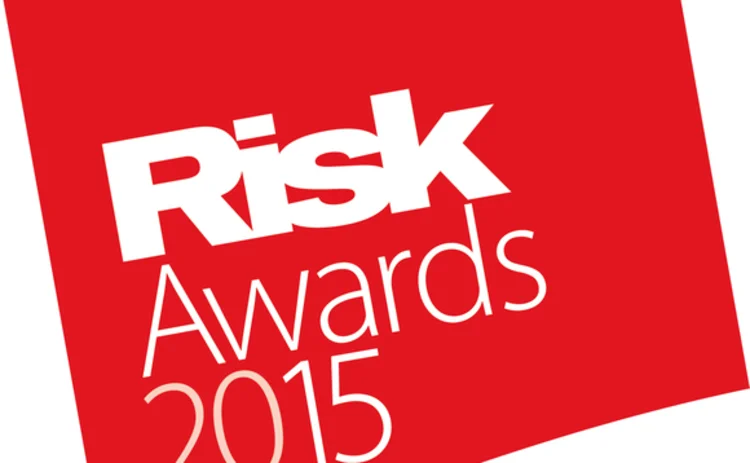
Risk awards 2015: The winners
Deutsche Bank is back-to-back winner of bank risk manager title; Napier Park wins hedge fund crown; Citi is top credit derivatives house; PKA takes second pension fund award in a row; Burgard and Kjaer named quants of the year

Big portfolio disposals, baffling market moves, hedge funds making hay while others lost a fortune, balletic risk management, the recovery of eurozone fallen angels - for a year that was relatively quiet during its first nine months, 2014 eventually managed to generate a fair amount of drama.
Arguably the biggest story for risk managers, traders and investors was the huge intraday swing in US Treasuries on October 15, and the forces that provoked it - press reports initially blamed it on electronic trading and thin dealer inventories, but Risk later pieced together a more complex tale of hedge fund crowding.
At the time, confusion reined, but it was a defining moment for a number of this year's Risk award winners - links to all 30 of the write-ups can be found below.
At Deutsche Bank, October 15 kicked off with an all-hands-on-deck meeting of senior traders and risk managers after a bank-wide value-at-risk limit was hit. A decision to slash exposure was taken quickly. The plan was communicated to Deutsche's board and the next day-and-a-half saw the bank shed roughly a third of its risk, as measured by VAR.
"In my 18 years at the bank I have never seen such a single-minded approach to take risk down so dramatically when called to do so," says Stuart Lewis, the bank's chief risk officer.
Elsewhere, the sudden burst of volatility and risk aversion became an opportunity. Napier Park Global Capital had been cautious for a while, viewing credit default swap (CDS) spreads as too narrow. The credit fund ventured into equity markets to execute a well-timed macro hedge in late August, and was positioned perfectly for the panic that would later hit CDS markets as spreads widened - October 14 was "one of our biggest buying days," says James O'Brien, the fund's chief executive.
In the old days, Napier Park would have had a lot more company, but O'Brien notes the field is now a lot thinner than it used to be: "The banks can no longer arbitrage the mis-pricings during these sell-offs, and that's where we can take advantage."
That highlights one of the themes of this year's awards - the retreat of dealers, and the corresponding advance of the buy side - with a number of the write-ups documenting the blurring, shifting boundary between the two.
For Andrew Feldstein, founder of BlueMountain Capital Management - and winner of this year's lifetime achievement award - structural inefficiencies are created by the fact that most market participants are boxed into a specific set of products, asset classes, strategies or regions. This can be exploited by firms with a more fluid approach, especially as regulation is limiting the part banks can play.
Singing from the same hymn sheet is a third fund - somewhat surprisingly, perhaps, Danish pension fund manager, PKA. It made money last year by identifying a series of mispricings that would traditionally have been the preserve of bank prop desks or hedge funds - in equity repo, index variance and basis swaps. The firm becomes a back-to-back winner of the pension fund category.
But while banks certainly are retreating, that story can be overdone. In reality, dealers are part-way through a process of deciding what they want to do, and focusing on it - take Citi's purchase of a $250 billion hedged portfolio of single-name CDSs from a European bank. Citi declined to reveal the seller, but enquiries by Risk journalists revealed it was Deutsche Bank.
While Deutsche wanted out of the non-cleared CDS market, Citi wanted in - sort of. The US bank acquired $450 billion of credit assets from various peers last year, but only because it believes it can use expertise gained while winding up its bad bank to recycle, compress or sell the assets at a gain. In the case of the Deutsche Bank portfolio, it has given itself six months to do so, and claims to be on track.
Societe Generale (SG) was also on the front foot, picking up four CDS portfolios worth €140 billion in notional from two European peers, taking on an inflation portfolio - not one of its traditional strengths - executing a big, creative longevity trade, and beginning the process of integrating Newedge into the bank.
"SG has been consistent in doing what we are best at doing," says Didier Valet, head of SG Corporate & Investment Banking. The bank wins this year's derivatives house of the year award, and also gets the nod for equity derivatives and risk solutions.
In other awards, Christoph Burgard of Barclays and Mats Kjaer - his former colleague, now at Bloomberg - are named quants of the year for work that gave funding valuation adjustment a much-needed methodological foundation; Portugal's debt office is named sovereign risk manager of the year; DoubleLine lands the inaugural award for asset managers; LCH.Clearnet takes the clearing house award. For daring to have a tilt at the established order in derivatives markets, UBS wins over-the-counter derivatives platform of the year, while MarketAxess takes the award for swap execution facility, for the same reason.
As always, it was not easy to pick winners. Where decisions were tight, client feedback often helped settle the issue. The Risk editorial team thanks all this year's participants for their time and help.
Banks were asked to submit information on their business in each of the asset class and product categories during 2014, and shortlisted companies underwent face-to-face and telephone interviews. Risk then gathered feedback from clients and other market participants.
The final decisions were made by Risk's editors and journalists, weighing a number of factors, including risk management, creativity and innovation, liquidity provision, quality of service, and engagement with regulatory issues.
The profiles of our winners can be found below.
Derivatives house of the year: Societe Generale
Lifetime achievement award: Andrew Feldstein
Bank risk manager of the year: Deutsche Bank
Quants of the year: Christoph Burgard, Mats Kjaer
Interest rate derivatives house of the year: Deutsche Bank
Equity derivatives house of the year: Societe Generale
Currency derivatives house of the year: BNP Paribas
Credit derivatives house of the year: Citi
Inflation derivatives house of the year: HSBC
Risk solutions house of the year: Societe Generale
OTC client clearer of the year: Citi
Structured products house of the year: Bank of America Merrill Lynch
Deal of the year: Blackstone/Morgan Stanley
Credit portfolio manager of the year: Crédit Agricole
Clearing house of the year: LCH.Clearnet
Hedge fund of the year: Napier Park Global Capital
Asset manager of the year: Doubleline Capital
Corporate risk manager of the year: Electricity Supply Board of Ireland
Sovereign risk manager of the year: IGCP
OTC infrastructure service of the year: TriOptima
OTC trading platform of the year: UBS Neo
Single-dealer platform of the year: Deutsche Bank
In-house system of the year: Danske Bank
Risk management technology product of the year: IBM Risk Analytics
Trading technology product of the year (vendor): Algomi
Trading technology product of the year (bank): Morgan Stanley
Only users who have a paid subscription or are part of a corporate subscription are able to print or copy content.
To access these options, along with all other subscription benefits, please contact info@risk.net or view our subscription options here: http://subscriptions.risk.net/subscribe
You are currently unable to print this content. Please contact info@risk.net to find out more.
You are currently unable to copy this content. Please contact info@risk.net to find out more.
Copyright Infopro Digital Limited. All rights reserved.
As outlined in our terms and conditions, https://www.infopro-digital.com/terms-and-conditions/subscriptions/ (point 2.4), printing is limited to a single copy.
If you would like to purchase additional rights please email info@risk.net
Copyright Infopro Digital Limited. All rights reserved.
You may share this content using our article tools. As outlined in our terms and conditions, https://www.infopro-digital.com/terms-and-conditions/subscriptions/ (clause 2.4), an Authorised User may only make one copy of the materials for their own personal use. You must also comply with the restrictions in clause 2.5.
If you would like to purchase additional rights please email info@risk.net
More on Markets
After market whipsaws, banks put new twist on QIS options
Variable strike options aim to catch recoveries after volatility spikes
Broker quoting gap keeps Eurex-LCH basis alive
Lack of differentiated prices helps retain CCP basis
QIS futures debut – but only simple ones for now
Goldman and Societe Generale kick-start Eurex market with equity baskets
Hedge funds trim US swap spreads on tariff decision
Investors cut back asset swap positions as Supreme Court ruling reignites deficit concerns
Opinions split on EU bond balance sheet squeeze
Some say QT and issuance wave will hamper intermediation; others say dealers nimble enough to respond
Eurex looks to shine ‘more light’ on off-book liquidity
Block order book initiative to aid price discovery slated for later this year
CME outage sparks FX soul search
How November’s halt exposed fragile wiring of new futures-led market structure
CME outage exposed FX market’s futures dependency, says SNB
Study finds EUR/USD spreads widened eightfold as non-bank PTFs blew out by nearly 30 times in November halt








